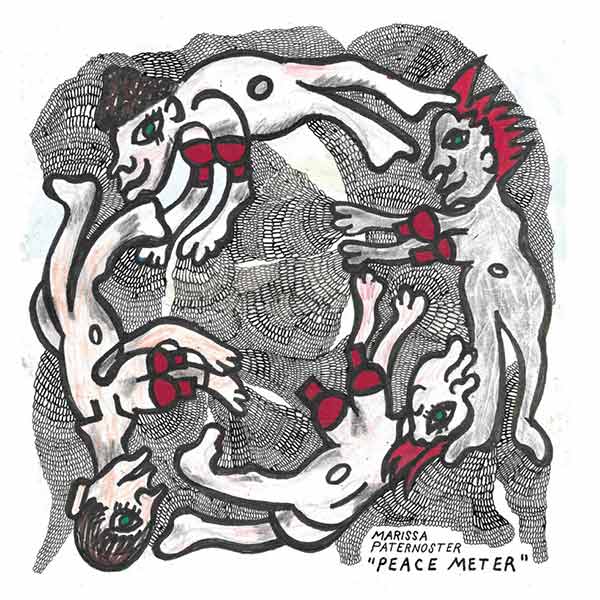
Review originally published 01.03.22 on Full Time Aesthetic.
On December 3, 2021, Marissa Paternoster released Peace Meter, her first solo record on Don Giovanni Records. Well-known for her wildly tenacious guitar solos, a roaring voice, and a commanding musical presence as the frontwoman of Screaming Females, Paternoster shows a more pensive side on her debut solo LP and gets deeply personal with songs about loss and longing.
With nine songs and spanning just over half an hour, Peace Meter is a solid listen with tracks that lean more heavily into 80’s goth synth rather than the fast-paced rock and roll that is associated with Screaming Females.
The album opens with “White Dove,” a stunning track with Paternoster laying out beautiful vocal melodies and intricate, delicate guitar strums. The video for the song features Paternoster walking through a cemetery, wearing a white dress and holding a wilting bouquet of roses, gazing somberly into the camera throughout the entire single-shot video. The song sounds almost like a funeral hymn, with Paternoster repeating the line “your feathers soaked in blood” throughout, which lays the foundation for Peace Meter as an album covering more serious topics. Traditionally, white doves symbolize peace and love but in the context of this song, that symbolism becomes tainted. About halfway through, the beat of the song picks up with the help of synth and drum beats but Paternoster’s voice becomes more subdued, offering a fresh and dynamic effect to the track.
As the record progresses, it becomes clear that this is an album specifically about romantic loss and the effect that the experience has had on Paternoster. The second song, “Black Hole” is melodically very catchy but features a dark undertone with Paternoster singing, “I’m awash in a big black hole without you.” Although the upbeat melody remains consistent throughout the song, the closing verse is tinged with melancholy as Paternoster proclaims, “I need evidence I can live without you/Catch a hiss with the horizon without you/Try my dress and then embalm me/I’m a statue in this fantasy/I’m awash in a big black hole without you.”
A notable collaboration on Peace Meter is the third track, “I Lost You,” a song about breaking up with a lover and not even being able to remain friends. Although the chorus features a sad sentiment of “I guess it’s sad/But it’s true/You don’t care/I’ve lost you,” the song is upbeat and danceable, with Snakeskin’s Shanna Polley on backing vocals and Lung’s Kate Wakefield on cello. According to the album’s press release, Paternoster had this to say about writing the song: “It’s one of my favorite songs I’ve ever written, and I think it’s safe to say that all parties involved brought their A game to this tune. After initially sending Andy (Gibbs, of THOU) the framework for this song, he immediately knew it could be transformed into more of an up-beat dance song with ease. I told him to go for it, and he did. Shanna’s (Polley, of Snakeskin) vocal refrains draw out the end of the song perfectly and Kate’s (Wakefield, of Lung) rapid-fire cello breaks add a lot of cutting texture to the song.”https://www.youtube.com/embed/IQ4nTgPY2vg?feature=oembed
The first half of the album is more upbeat than the latter half, but only slightly. The album is arranged quite well, with great pacing throughout. The middle track—appropriately titled “Balance Beam”—serves as one of the most beautiful songs on the album. Paternoster gently strums her guitar as she addresses her subject with an earnest gentleness even though she’s experiencing deep heartbreak. By featuring a variety of tones and tempos on Peace Meter, Paternoster truly highlights her skill and breadth as a musician. The songs are very much her own and her satisfaction with the work she put in is apparent throughout the record.
If you’re looking for a signature Paternoster guitar solo on this album, you can find it on “Running,” a funky song about traversing whatever is necessary to be with your true love again. “Let me be the one you come running to,” Paternoster repeats throughout, as drums and synth help shape the song into a danceable and memorable track.

Paternoster performing with Screaming Females (photo by Kate Hoos)
According to the album’s press release, Paternoster began writing Peace Meter immediately after arriving home from a west coast tour cut short due to COVID. Alone in her deceased grandmother’s empty home, Paternoster sent the skeleton of a song to Andy Gibbs from the metal band THOU with the hopes that he might be able to extrapolate on the original idea. Andy sent his accompaniment back, and that process continued for the bulk of the first wave of quarantine. All parts were recorded separately during the pandemic and mixed by Eric Bennett as he was quarantined at home alongside his mixing studio.
Paternoster’s talent truly knows no bounds and in Peace Meter, she has created an album that is striking, reflective, and an absolute work of art. A visual artist as well as a musician, the cover art features one of her drawings of four human-like figures with breasts positioned in front of each other with their arms outstretched in a continuous circle as if they were swimming. Perhaps a reflection on the cycle of love and longing or maybe a representation of past lovers, the art evokes a peaceful sentiment that is fitting for the record.
Find Marissa Paternoster on:
Instagram, Twitter, Facebook, YouTube
Peace Meter is out now on all streaming platforms via Don Giovanni Records.


